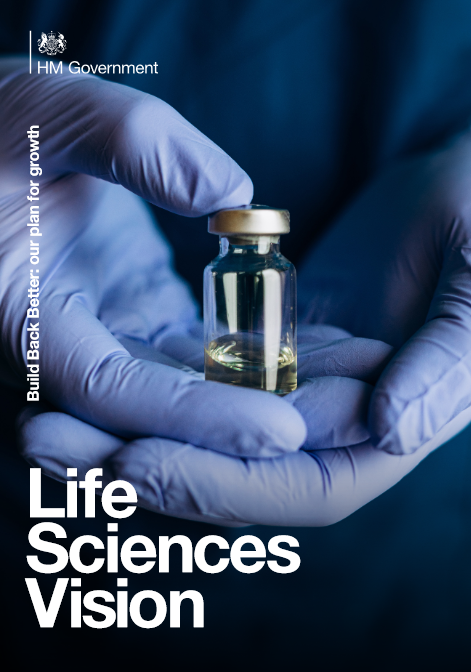 The UK government has today published its ten-year strategy for the life sciences. Building on the successes of the COVID-19 response, the strategy aims to help the NHS to solve the UK’s biggest health challenges by creating an “environment in which industry can grow and succeed in the UK, and patients and the NHS can receive a real benefit”. To deliver this ambition, the vision will invest in the UK’s world-leading science base, support a thriving life sciences sector and clinical research infrastructure, help embed research into patient care through the NHS, and support critical skills areas, including clinical pharmacology.
The UK government has today published its ten-year strategy for the life sciences. Building on the successes of the COVID-19 response, the strategy aims to help the NHS to solve the UK’s biggest health challenges by creating an “environment in which industry can grow and succeed in the UK, and patients and the NHS can receive a real benefit”. To deliver this ambition, the vision will invest in the UK’s world-leading science base, support a thriving life sciences sector and clinical research infrastructure, help embed research into patient care through the NHS, and support critical skills areas, including clinical pharmacology.
The vision outlines 7 ‘missions’, each focusing on addressing specific conditions that reflect the priorities of the NHS Long-Term Plan and the government's vision for the 'Future of UK Clinical Research Delivery'. These missions include improving translational opportunities in neurodegeneration and dementia, supporting the discovery and development of new vaccines, and enabling early diagnosis and treatments.
The Society’s President, Professor Sir Munir Pirmohamed, said:
The COVID-19 response has shown what can be achieved when the NHS, life sciences industry and regulators work together. This vision is a real opportunity to learn from, and build on, this way of working. Developing the workforce of the future will be at the heart of delivering better health outcomes for patients and - as the vision notes - clinical pharmacologists must be part of this workforce.
Investing in UK clinical pharmacology can help harness the power of genomics, through the implementation of pharmacogenomics and stratification of trials. Clinical pharmacologists can also help build capacity in clinical trials (particularly in early phase), support innovative trial design and associated regulation, and help realise the potential of connected patient data.
As medicines experts, clinical pharmacologists can also provide integrated assessment and care for patients. The new vision rightly supports a shift to prevention, early diagnosis, and treatment - but investment in clinical pharmacology now will also have the added benefit of supporting integrated care for patients (especially older patients) with multiple long-term conditions and complex polypharmacy.
Therefore, investment in clinical pharmacology can have wider benefits too – supporting not only the new vision, but also the government’s vision for clinical research delivery and the NHS Long-Term Plan. There is a real opportunity for synergy and impact.
As part of the Clinical Pharmacology Skills Alliance (CPSA), the Society is calling for investment in clinical pharmacology for healthier patients, better medicines and a more efficient NHS, through:
Implementation of genomic medicine
To help ensure that the right patient receives the right medicine, clinical pharmacologists can
- Lead implementation of pharmacogenomics (including education and training) to reduce harms and improve efficacy.
- Stratify by disease, genomics and other biomarkers, embedding this into trials and clinical practice to guide treatments to specific populations.
- Support functional genomics to improve the identification of potential drug targets.
Increased capacity and capability in clinical research and life sciences
The development of new medicines and treatments is essential to address unmet clinical need, bringing benefit for both society and the UK economy. Clinical pharmacologists can:
- Advise on trial methodology and regulatory requirements, including hybrid and adaptive designs, digital and decentralised trials, master protocols and efficient platform trials.
- Deliver and support more innovative early phase trials.
- Lead use of electronic health record data, gaining insights via state-of-the-art analytics.
- Support and train the wider NHS workforce, so more healthcare professionals (including those in under-served areas) can reach patients with research.
Tackling multimorbidity and complex polypharmacy
An ageing population means that complexity of care and medicines management pose a major challenge for the NHS. In partnership with pharmacy, clinical pharmacologists can:
- Improve the safe, effective and cost-effective use of medicines[1] e.g., in complex polypharmacy, by decreasing adverse drug reactions and prescribing errors, and improved prevention and management of drug-drug interactions.
- Support education and training, so the NHS workforce is skilled in the use of medicines.
Read more about the Clinical Pharmacology Skills Alliance
here
Read about the contributions of clinical pharmacology to the COVID-19 response
here and
here.